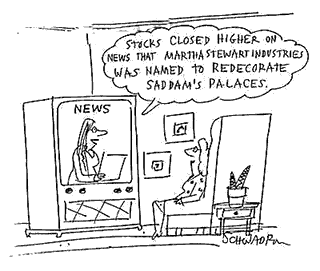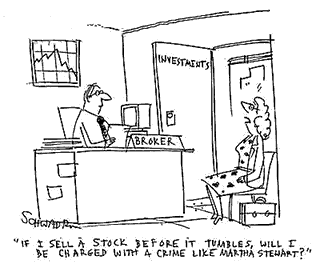Many people think those are one and the same issue. But that is incorrect. After more than a year of associating Martha Stewart with stock market insider trading, the U.S. Justice Department declined to indict the well-known queen of domesticity for that "crime." In other words, after a year of investigation, the U.S. attorney for the Southern District of New York, James Comey, decided that he could not prove to a jury beyond a reasonable doubt that Martha Stewart had illegally traded stock on the basis of material nonpublic information about a publicly held company. (As we'll see, there's more to the charge than that).
 |
That did not stop the Securities and Exchange Commission (SEC) from making the charge in a civil suit against her. But, of course, a civil suit carries a much lighter burden of proof (a preponderance of the evidence). The SEC's legal piling-on is explicable when you understand that should Martha Stewart lose, she would be barred for life from sitting on any corporation's board of directors.
If the U.S. attorney declined to seek an indictment for insider trading, what, then, is in the five-count bill against her? (The media widely report that the bill contained nine counts. Wrong. The government issued a single bill against her and her former Merrill Lynch broker, Peter Bacanovic. The combined charges total nine.)
Instead of being about stock market insider trading, the case against Martha Stewart is, as U.S. Attorney Comey put it at a news conference, "all about lying - lying to the FBI, lying to the SEC, and lying to investors." Specifically, the charges are obstruction of justice, conspiracy, and securities fraud. (She was not charged with perjury because her statements to the government were not made under oath.) These sound serious. Indeed, all told, they carry a penalty up to 30 years in prison and millions of dollars in fines. Yet, as we'll see, the case is a house of cards - worse: a house of cards standing on a foundation of quicksand.
First some background. Martha Stewart owned several thousand shares of a company called ImClone, which in 2001 attempted to get the Food and Drug Administration (FDA) to approve its anti-cancer drug, Erbitux. The CEO and brains behind ImClone was Sam Waksal, a friend of Stewart's. In December 2001 Stewart sold nearly 4,000 shares of ImClone for about $220,000. The sale occurred a day or so before the FDA refused to consider ImClone's application for the drug. It turns out that Waksal learned of the FDA decision before it was made public. According to charges to which he has pled guilty and for which he has been sentenced to seven years in prison, he told family members to sell their stock and attempted to sell his own, although his company's rules forbade it.
The government does not claim that Waksal tipped Stewart off about the FDA. Instead, it charges that Bacanovic directed his assistant, Douglas Faneuil, to call and tell her that he expected ImClone's price to drop and that Waksal was selling. Faneuil first left a phone message and then spoke with Stewart. When Stewart was asked about the stock sale, she said she had no information about Waksal and that she had earlier instructed Bacanovic to sell if the price dropped to $60. (It traded at $57 the day she sold.) Bacanovic backs up this account. Faneuil did so at first, but later turned state's evidence, claiming he was offered inducements to lie.
The government says that Bacanovic's knowledge of Waksal's intention to sell his shares constituted insider information, which he passed along to Stewart, which she in turn used as a basis for her sale. It alleges that Stewart misled government investigators by fabricating the $60 sell-order and by repeatedly claiming she spoke with Bacanovic on the day in question rather than Faneuil. (That a very busy woman forgot that she spoke with her broker's assistant rather than her broker a year earlier apparently is grounds for an obstruction-of-justice charge.) Further she is charged with altering a computer telephone message, from noting that Bacanovic thought the share price was about to fall to the generic "re ImClone." But in a truly weird aspect of this case, the bill of indictment states that Stewart immediately restored the message to its original form. Is that really a crime?.
She is also charged with securities fraud - the most bizarre part of the case of all. The charge has no direct relationship to the sale of her ImClone shares. Her securities fraud, according to the government, consists of her public declarations of her innocence of the government's public allegations that she had engaged in insider trading. By so declaring, says the government, she misled investors with respect to her publicly traded company, Martha Stewart Living Omnimedia. In other words, the government's campaign against her was driving down the stock price of her own company and her statements in self-defense were attempts to protect the price by giving false information to investors.
This charge has caused some people to marvel at the government's innovativeness. Proclaiming one's innocence can now be regarded as fraud.
The first thing to notice about the government's case is that its basis is an alleged offense that the government did not ask for an indictment on: stock market insider trading. Stewart stands accused of lying about an activity that the government won't attempt to prove was illegal. Does this sound proper in a society that touts its devotion to the rule of law?
We have to examine stock market insider trading to understand the case, for without such a concept, there is no case. Henry Manne, dean emeritus of George Mason University Law School, is the authority on this sorry idea of law. (In 1966 he published Insider Trading and the Stock Market). Manne points out that insider trading was not illegal until the 1960s. Many people think it goes back to the Great Depression and the New Deal, when the SEC was created. But as Manne notes, insider trading could not have been much of an issue during the stock-market crash. If it had been, many insiders would have avoided the disaster.
Then why did it become an issue 30 years later? As Manne told syndicated columnist Larry Elder.
 |
Congress needed some kind of morality story to hinge everything on, and the very phrase, 'insider trading,' suggested to people that something evil has been done. The SEC, at least since the 1960s, has been very successful in making this into one of the most egregious evils in the world. If you want to say that anyone's really done something terrible, it's not incest, or murder, or treason, it's insider trading.
Under the U.S. Constitution, Congress is the legislative branch of government. But Congress has long violated the founding document by illegally delegating its legislative powers to so-called independent regulatory agencies. This has been especially egregious with the SEC. Rather than clearly defining "insider trading," as one would expect under the rule of law, Congress told the SEC to define it any way it liked.
As an aside, after the Michael Milken episode, when Congress held hearings to consider finally defining the term, the SEC and its friends urged Congress not to do so because a clear definition would permit bad people to stay just inside the law. So much for the rule of law, which at a minimum requires that citizens know in advance whether their conduct is illegal.
As the current SEC regulations stand, to be guilty of stock market insider trading one must be "in breach of a duty of trust or confidence that is owed directly, indirectly, or derivatively, to the issuer of that security or the shareholders of that issuer, or to any other person who is the source of the material nonpublic information."
I leave it to the reader to decide whether this even applies to Martha Stewart. In the next article we will show that stock market insider trading per se violates no one's rights and is generally beneficial.
Please do not copy/paste this content without permission. If you want to use any of it on your website contact us via email traderATfinancial-spread-betting.com (remove the AT and substitute by @).